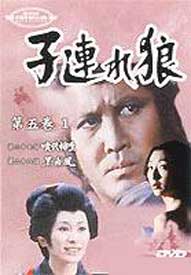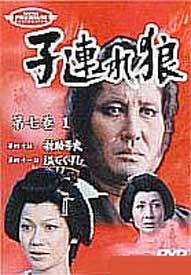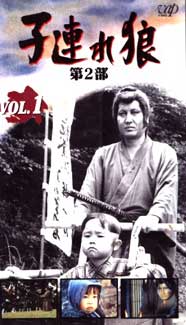 The second season of the television series Lone Wolf & Cub starts off with the episode The Jojiro Yagyu Black Faces of Death. Young Shobei of the Yagyu clan & all his followers are informed by their clan's lord Retsudo that at any cost, they must kill Ogami Itto. The second season of the television series Lone Wolf & Cub starts off with the episode The Jojiro Yagyu Black Faces of Death. Young Shobei of the Yagyu clan & all his followers are informed by their clan's lord Retsudo that at any cost, they must kill Ogami Itto.
Itto has by this time killed so many of the Yagyu that only Shobei & his sister Sayaka remain who might carry on Retsudo's bloodline. They are his children by a mistress, & he had formerly ignored their existence, never having imagined vengeance against Itto would cause him to rely on bastards. Retsudo says he will not plague them with the duty of preserving the family lineage, for Itto's death is the only thing that matters.
Yet he also wants to bare a child by his own daughter, Sayaka, to preserve his name. This plan horrifies even self-sacrificing Shobei & Sayaka. It is however not in their nature to rebel.
A group of Yagyu assassins known as "the Black Faces of Death" pose as wandering komuso monks who play shakuhachi flute. Their flutes double as poison dart blowguns. These assassins are on the road in search of Itto Ogami who as always is travelling with his young son Daigoro, pushing the boy in a wooden babycart.
Itto & Daigoro had been lingering at a shrine because Daigoro came down with fever. "I did not know you were such a weak child," said Itto. "You are no son of mine." So Daigoro leaps up ready to travel on, hiding all signs of illness.
It sounded cruel, but the bond between father & son can never be doubted. The reason they had to move on so quicky was to confront the Black Faces of Death on the road, without troubling the priest of the shrine.
Soon there is mass carnage on the highway. Itto is seemingly more annoyed than he would ordinarily convey, being most often aloof even while slaying.
Eventually Itto will have to face Shobei, who is more samurai-like than assassin in wanting to test his two-sword style against Itto's suio swallow cut. The moment of the match inevitably arrives, with Daigoro gazing on.
We of course never doubt Itto's pre-eminence in such duels, so the physical beauty of these encounters is what matters. The duel, & Shobei's defeat, are marked by great beauty & sadness.
Shobei refuses to die of his wound until he can be reunited one last time with his sister, for sake of demented desire.
 The rowdy Onigon gang runs roughshod over a tiny post-town. The Onigons hate the Kawashima gang & a fight is brewing. Into this Yojimbo-like setting comes Ogami Itto pushing Daigoro in the babycart, in Dark Southern Winds, the second season second episode of Assassin with Child. The rowdy Onigon gang runs roughshod over a tiny post-town. The Onigons hate the Kawashima gang & a fight is brewing. Into this Yojimbo-like setting comes Ogami Itto pushing Daigoro in the babycart, in Dark Southern Winds, the second season second episode of Assassin with Child.
Kinnosuke Yorozuya's make-up design for Itto is often overdone, showing Kinnosuke's kabuki heritage. In this episode he's got enough make-up on to pass as a drag queen. There's also the ongoing problem of the Itto wig looking like a dead squirrel pasted on his head.
Such excess of "design" for the character can be distracting & makes a viewer appreciate all the more the realistic look of Tomisaburo Wakayama when he played the role in the six-film feature series. Nevertheless, Kinnosuke is so strongly inside his role that he is entirely convincing, & after a while, the excessive make-up & wig become expressionist & dramatically convincing, like the gaudy characters of kabuki theater itself.
Little Daigoro, perpetually three years old, befriends a tipsy malancholy prostitute named Hideh (Akiko Izumi). She wishes she could one more time be the innocent person she once was in her home village. Her village made a living from cedar trees, & she remembers days of youth when the entire village would unite to plant cedar seedlings the way other villages planted rice.
After a lovely night with Daigoro as respite from her horrible life, Hideah feels bereft as she watches the father & son continue on their way. She runs after them when she discovers Daigoro has forgotten his paper pinwheel.
Since Itto had 500 ryo on him, we know he must be in the post town to fulfill an assassin's commission. Hideh arrives on the scene in time to witness his intervention, at a bridge, against the troublesome Onigon gang.
When Daigoro is at risk of being killed, Hideh protects him with her body, & as she lays dying says, "No one will mourn trash like me. I am only sad I could not visit my village one last time."
A second story unfolds in the same episode, set in the cedar village where corrupt samurai officials have enslaved & abuse farmers for free labor to build a dike under unnecessarily cruel conditions.
The local bailiff, Harada, would like to intervene in the villagers' behalf, but Ichige, the bridge magistrate & a superior swordsman, is politically well-placed to have things his way, working farmers to death while their own work among the cedars falls behind. The bailiff has done all he can within the law, & has failed to stop the cruelty.
Itto has no assassin's commission so is not inclined to interfer, but of course his presence gains puzzled attention, especially as his activity is unexpected of any samurai, even one who is masterless.
The peasants are startled & impressed, but the corrupt samurai would never be able to fathom Itto's heartfelt desire to work alongside peasant farmers planting cedar seedlings in Hideh's memory.
With each seedling Itto plants, he places a lock of Hideh's hair, Daigoro assisting. When Ichige the bad guy wants more laborers, his men are willing to demand even a ronin be forced to work, since he's doing peasant labor anyway. When Itto refuses to stop planting cedars & work on the dike, he is obviously encouraging Ichige & his men to attack him.
Since strict adherence to the law is what has kept Sir Harada from doing the right thing as bailiff, he uses that same strict adherence to refuse to send his men to fight against Itto alongside Sir Ichige. By now they've all figured out who Itto is, & Harada points out that his position as a servant of the government prohibits his participating in grudge fights.
It's an unusual episode in that assassins do not voluntarily involve themselves in fights they have not been paid for, & generally Itto is a stickler for that tradition. This time he could not resist because of his debt to Hideh who died protecting Daigoro. It's an unusually good episode in a series that sustained a surprisingly high standard throughout its run.
copyright © by Paghat the Ratgirl
|


